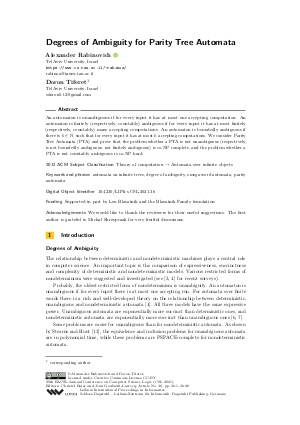Degrees of Ambiguity for Parity Tree Automata
Authors
Alexander Rabinovich  ,
Doron Tiferet
,
Doron Tiferet
-
Part of:
Volume:
29th EACSL Annual Conference on Computer Science Logic (CSL 2021)
Part of: Series: Leibniz International Proceedings in Informatics (LIPIcs)
Part of: Conference: Computer Science Logic (CSL) - License:
 Creative Commons Attribution 3.0 Unported license
Creative Commons Attribution 3.0 Unported license
- Publication Date: 2021-01-13
File

PDF
LIPIcs.CSL.2021.36.pdf
- Filesize: 0.55 MB
- 20 pages
Document Identifiers
Subject Classification
ACM Subject Classification
- Theory of computation → Automata over infinite objects
Keywords
- automata on infinite trees
- degree of ambiguity
- omega word automata
- parity automata
Metrics
- Access Statistics
-
Total Accesses (updated on a weekly basis)
0Document
0Metadata
Abstract
An automaton is unambiguous if for every input it has at most one accepting computation. An automaton is finitely (respectively, countably) ambiguous if for every input it has at most finitely (respectively, countably) many accepting computations. An automaton is boundedly ambiguous if there is k ∈ ℕ, such that for every input it has at most k accepting computations. We consider Parity Tree Automata (PTA) and prove that the problem whether a PTA is not unambiguous (respectively, is not boundedly ambiguous, not finitely ambiguous) is co-NP complete, and the problem whether a PTA is not countably ambiguous is co-NP hard.
Cite As Get BibTex
Alexander Rabinovich and Doron Tiferet. Degrees of Ambiguity for Parity Tree Automata. In 29th EACSL Annual Conference on Computer Science Logic (CSL 2021). Leibniz International Proceedings in Informatics (LIPIcs), Volume 183, pp. 36:1-36:20, Schloss Dagstuhl – Leibniz-Zentrum für Informatik (2021)
https://doi.org/10.4230/LIPIcs.CSL.2021.36
BibTex
@InProceedings{rabinovich_et_al:LIPIcs.CSL.2021.36,
author = {Rabinovich, Alexander and Tiferet, Doron},
title = {{Degrees of Ambiguity for Parity Tree Automata}},
booktitle = {29th EACSL Annual Conference on Computer Science Logic (CSL 2021)},
pages = {36:1--36:20},
series = {Leibniz International Proceedings in Informatics (LIPIcs)},
ISBN = {978-3-95977-175-7},
ISSN = {1868-8969},
year = {2021},
volume = {183},
editor = {Baier, Christel and Goubault-Larrecq, Jean},
publisher = {Schloss Dagstuhl -- Leibniz-Zentrum f{\"u}r Informatik},
address = {Dagstuhl, Germany},
URL = {https://drops.dagstuhl.de/entities/document/10.4230/LIPIcs.CSL.2021.36},
URN = {urn:nbn:de:0030-drops-134709},
doi = {10.4230/LIPIcs.CSL.2021.36},
annote = {Keywords: automata on infinite trees, degree of ambiguity, omega word automata, parity automata}
}
Author Details
Funding
Supported in part by Len Blavatnik and the Blavatnik Family foundation.
Acknowledgements
We would like to thank the reviewers for their useful suggestions. The first author is grateful to Michał Skrzypczak for very fruitful discussions.
References
-
Vince Bárány, Łukasz Kaiser, and Alex Rabinovich. Expressing cardinality quantifiers in monadic second-order logic over trees. Fundamenta Informaticae, 100(1-4):1-17, 2010.

-
Krishnendu Chatterjee, Thomas A Henzinger, and Nir Piterman. Generalized parity games. In International Conference on Foundations of Software Science and Computational Structures, pages 153-167. Springer, 2007.

-
Thomas Colcombet. Unambiguity in automata theory. In International Workshop on Descriptional Complexity of Formal Systems, pages 3-18. Springer, 2015.

-
Yo-Sub Han, Arto Salomaa, and Kai Salomaa. Ambiguity, nondeterminism and state complexity of finite automata. Acta Cybernetica, 23(1):141-157, 2017.

-
Jozef Jirásek, Galina Jirásková, and Juraj Šebej. Operations on unambiguous finite automata. In International Conference on Developments in Language Theory, pages 243-255. Springer, 2016.

-
Ernst Leiss. Succinct representation of regular languages by boolean automata. Theoretical computer science, 13(3):323-330, 1981.

-
Hing Leung. Descriptional complexity of nfa of different ambiguity. International Journal of Foundations of Computer Science, 16(05):975-984, 2005.

- Christof Löding and Anton Pirogov. On finitely ambiguous büchi automata. In Mizuho Hoshi and Shinnosuke Seki, editors, Developments in Language Theory - 22nd International Conference, DLT 2018, Tokyo, Japan, September 10-14, 2018, Proceedings, volume 11088 of Lecture Notes in Computer Science, pages 503-515. Springer, 2018. URL: https://doi.org/10.1007/978-3-319-98654-8_41.
-
Dominique Perrin and Jean-Éric Pin. Infinite words: automata, semigroups, logic and games, volume 141. Academic Press, 2004.

-
Alexander Rabinovich. Complementation of finitely ambiguous Büchi automata. In International Conference on Developments in Language Theory, pages 541-552. Springer, 2018.

- Alexander Rabinovich and Doron Tiferet. Degrees of ambiguity of büchi tree automata. In Arkadev Chattopadhyay and Paul Gastin, editors, 39th IARCS Annual Conference on Foundations of Software Technology and Theoretical Computer Science, FSTTCS 2019, December 11-13, 2019, Bombay, India, volume 150 of LIPIcs, pages 50:1-50:14. Schloss Dagstuhl - Leibniz-Zentrum für Informatik, 2019. URL: https://doi.org/10.4230/LIPIcs.FSTTCS.2019.50.
-
Helmut Seidl. On the finite degree of ambiguity of finite tree automata. Acta Informatica, 26(6):527-542, 1989.

-
Richard Edwin Stearns and Harry B Hunt III. On the equivalence and containment problems for unambiguous regular expressions, regular grammars and finite automata. SIAM Journal on Computing, 14(3):598-611, 1985.

-
Wolfgang Thomas. Automata on infinite objects. In Formal Models and Semantics, pages 133-191. Elsevier, 1990.

-
Andreas Weber and Helmut Seidl. On the degree of ambiguity of finite automata. Theoretical Computer Science, 88(2):325-349, 1991.

